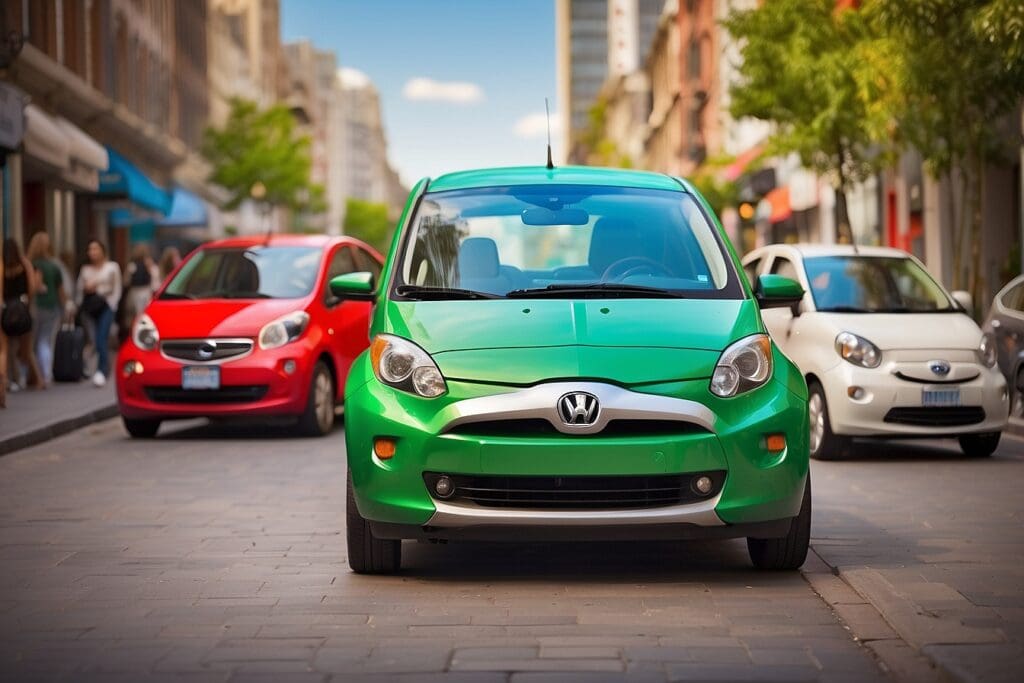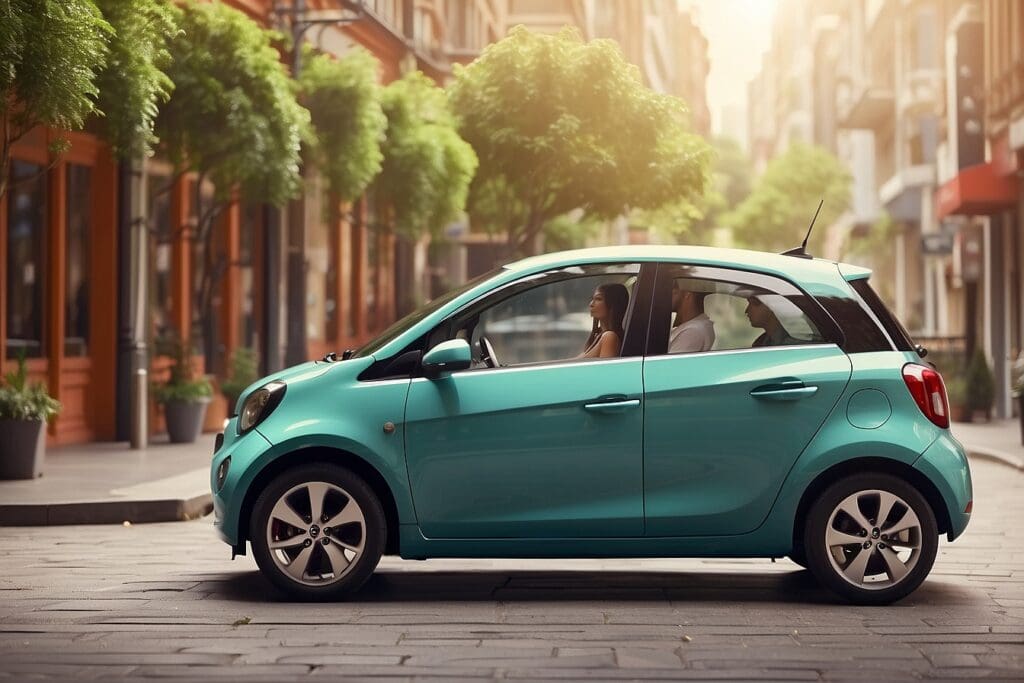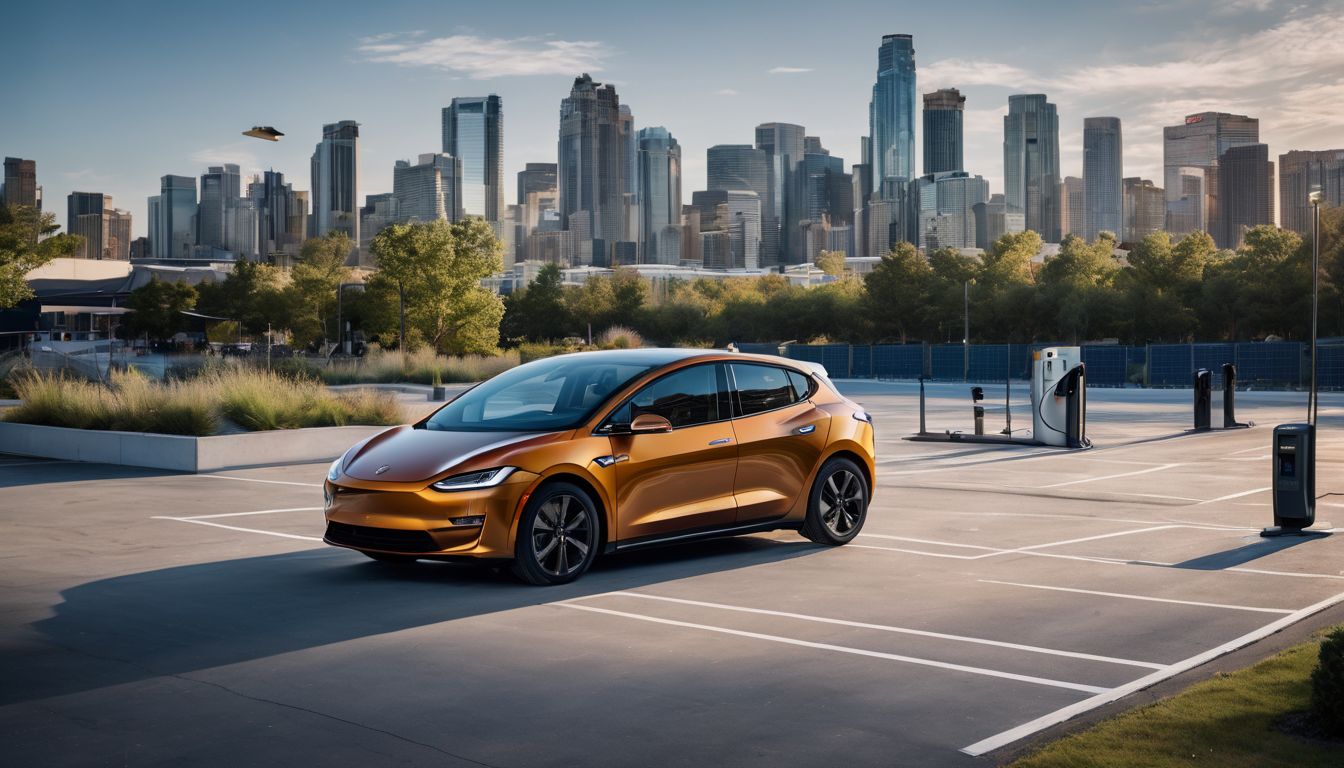Ever felt a touch overwhelmed by the relentless stream of cars that crowd our roads and the toll they take on our dear planet? You’re not alone in this sentiment. Our foray into car sharing has unveiled rather promising insights — it transpires that each shared vehicle could replace up to 10 privately owned ones, mitigating congestion on our streets.
Embarking on this journey opens up a vista to fresher air and more tranquil avenues. Do continue reading; together, let’s navigate this greener path less travelled!
Key Takeaways
- Car sharing can replace up to 10 private cars, reducing road congestion and contributing to cleaner air by cutting down greenhouse gas emissions.
- Adopting car sharing practices lessens the demand for building new roads and parking lots, protecting land from soil pollution and natural habitats from destruction.
- Usage of electric vehicles is promoted through car sharing schemes, leading to a significant reduction in carbon footprint and support for green technology advancements.
- Financial benefits arise from car sharing as individuals split costs like maintenance, insurance, and fuel, making it a cost-effective transportation option.
- Traffic congestion is alleviated with fewer personal vehicles on the road due to car sharing programs, enhancing mobility and reducing urban stress.
Environmental Impacts of Private Car Ownership

Private car ownership has a significant environmental impact, contributing to greenhouse gas emissions, land and soil pollution, and water pollution. These negative effects can have lasting consequences on the environment and public health.
Greenhouse gas emissions
Every time we choose to drive alone, our cars pump out greenhouse gases that heat up the planet. These emissions include carbon dioxide, methane, and nitrous oxide, all of which trap heat in the atmosphere and lead to global warming.
Car sharing slashes the number of vehicles on the road, directly decreasing greenhouse gas emissions.
By opting for shared mobility instead of private vehicles, we’re doing more than just cutting down on traffic; we’re contributing to cleaner air and a sustainable future. We make room for green spaces by lowering our collective carbon footprint with fewer cars clogging up streets.
This shift towards carpooling and ecofriendly driving is a powerful move against air pollution as it encourages sustainable living and promotes healthier local air quality.
Land and soil pollution
Car sharing helps reduce land and soil pollution by decreasing the demand for new parking lots and roads. With fewer cars on the road, there is less need for expanding infrastructure, which can lead to reduced soil erosion and habitat destruction.
Additionally, as car-sharing services promote more sustainable transportation options such as electric vehicles, there is a decrease in harmful chemical runoff from traditional car maintenance, therefore minimising soil contamination.
Moreover, by embracing car sharing as an alternative mode of transportation, individuals contribute to preserving green and open spaces from being turned into parking lots. This approach fosters a healthier environment and protects natural habitats while ensuring that local air quality remains uncompromised.
Water pollution
Transitioning from land and soil pollution to water pollution, car sharing significantly reduces the release of harmful pollutants that can contaminate water sources. By decreasing greenhouse gas emissions and promoting the usage of modern vehicles, car sharing contributes to improved local air quality, which in turn helps reduce the potential for water pollution.
Moreover, through the increased usage of electric vehicles and green commuting practices, car sharing plays a vital role in reducing the impact of transportation on water quality by lowering air pollution and carbon footprint.
By encouraging alternative transportation methods and supporting public transit, environmentally conscious individuals can actively contribute to mitigating the risks associated with water pollution.
The Benefits of Car Sharing for the Environment
Car sharing brings about a decrease in greenhouse gas emissions and helps to reduce our carbon footprint. Additionally, it encourages the increased usage of electric vehicles, all contributing to a healthier environment for us all.
Decreased greenhouse gas emissions
Car sharing significantly reduces greenhouse gas emissions, contributing to cleaner air and a healthier environment. By sharing cars, we decrease the number of vehicles on the road, leading to less fuel consumption and lower emissions of carbon dioxide and other pollutants.
This reduction in harmful emissions positively impacts local air quality, helping to combat climate change and improve public health. Modern vehicle usage through car sharing further reduces our carbon footprint, supporting environmental conservation efforts.
Moreover, decreased greenhouse gas emissions resulting from car sharing align with the goal of reducing overall pollution levels and promoting sustainable transportation options in our communities.
Reduced carbon footprint
By using car sharing services, we reduce our carbon footprint. This means that less greenhouse gases are emitted into the atmosphere when we choose to share a vehicle rather than owning one individually.
It’s a simple but effective way to contribute to air pollution reduction and local air quality improvement. Additionally, opting for shared vehicles also helps in decreasing emissions overall.
Furthermore, car sharing leads to a reduction in emissions by encouraging the use of electric vehicles. Through this approach, there is an impactful decrease in harmful pollutants released into the environment, which contributes significantly towards reducing our carbon footprint and promoting sustainability.
Increased usage of electric vehicles
Transitioning from reducing carbon footprints to the increased usage of electric vehicles is a significant step in addressing environmental concerns. Embracing electric vehicles in car-sharing schemes reduces our reliance on traditional fuel-powered cars, thus decreasing harmful emissions and promoting cleaner air quality.
When choosing electric vehicles for shared mobility, we contribute to lowering greenhouse gas emissions while also supporting technological advancements that lead to more sustainable transportation options.
Furthermore, by embracing the use of electric vehicles within car-sharing programmes, we actively participate in reducing our carbon footprint and promoting eco-friendly alternatives for everyday travel.
Less land and soil pollution
Car sharing reduces the demand for parking spaces, decreasing the need for large parking lots and thereby minimising land use for vehicle storage. In turn, this lessens soil pollution caused by oil leaks and other automotive fluids that can seep into the soil from traditional car parks.
By reducing the number of individual cars on the road through car sharing, we also decrease wear and tear on roads and subsequently minimise soil erosion.
Moreover, with car sharing contributing to fewer vehicles being produced, there is a reduction in resources used for extensive manufacturing processes which require vast areas of land.
Less water pollution
Car sharing reduces water pollution by decreasing the number of cars on the road, resulting in fewer oil and chemical runoff entering water systems. With fewer vehicles being used, there is a decrease in harmful pollutants such as motor oil, antifreeze, and other chemicals that are washed off roads and into bodies of water during rainfall.
This reduction in harmful substances benefits aquatic ecosystems and helps maintain healthy water quality.
In addition to reducing water pollution from vehicle-related chemicals, car sharing also minimises the environmental impact associated with car production. By extending the lifespan of vehicles through shared usage, it lessens the demand for new car manufacturing which involves processes that can contribute to heavy metal contamination in bodies of water during production and disposal.
Additional Benefits of Car Sharing

– Enjoy financial savings with car sharing, as you can split the costs of maintenance, insurance, and fuel with others.
– Car sharing also allows for convenient access to different types of cars depending on your needs, increases small or new car usage, and reduces traffic congestion in urban areas.
Financial savings
Car sharing offers significant financial savings for individuals. By sharing a car instead of owning one, people can avoid the costs associated with purchasing, maintaining, and insuring a personal vehicle.
Additionally, car-sharing services often include fuel and maintenance expenses in their pricing, further reducing the financial burden on users. This not only benefits the individual but also contributes to a collective effort towards environmental conservation by promoting a more sustainable and cost-effective mode of transportation that aligns with our desire to reduce emissions and minimise our carbon footprint.
Access to different types of cars
By utilising car sharing services, we can access a wide variety of vehicles to suit our specific needs. This includes electric cars for short journeys in urban areas, larger vehicles for family trips or moving house, and even luxury cars for special occasions.
Having access to various car types allows us to choose the most environmentally friendly option for each journey, helping reduce emissions and our carbon footprint.
Furthermore, by using car sharing platforms, we contribute to increasing the usage of small or new cars. This not only offers more options but also promotes the use of energy-efficient and low-emission vehicles across different terrain and purposes, contributing significantly to environmental preservation efforts.
Convenience and flexibility
Having access to different types of cars through car sharing offers a level of convenience and flexibility that is unmatched by traditional car ownership. Whether it’s a compact car for city errands or an SUV for weekend getaways, individuals can choose the right vehicle for their specific needs without being tied down to a single car.
This flexibility allows for efficient and cost-effective transportation solutions while also contributing to reducing emissions and carbon footprints as we actively make choices that prioritise environmental conservation.
Furthermore, the convenience of being able to pick up and drop off cars at various locations provides added freedom in travel planning. Instead of worrying about maintenance, insurance, and parking logistics typically associated with private ownership, environmentally conscious individuals can simply enjoy the ease and practicality of using shared mobility services whenever needed.
Increase in small or new car usage
With the convenience and flexibility that car sharing offers, there has been a noticeable increase in the usage of small or new cars. This shift towards smaller vehicles not only contributes to reducing carbon emissions but also aligns with the trend towards more sustainable transportation options.
Embracing newer models of vehicles within car-sharing services supports environmental sustainability by promoting the use of fuel-efficient and low-emission cars, thereby lowering our overall impact on the environment.
The preference for small or new cars enhances their utilisation and encourages manufacturers to develop innovative models that are eco-friendly. As environmentally conscious individuals, supporting conservation and environmental initiatives such as car sharing can significantly influence the automotive industry’s approach to creating more sustainable transportation solutions.
Reduction in traffic congestion
Car sharing contributes to a decrease in traffic congestion, as it reduces the number of vehicles on the road. By participating in car sharing schemes, individuals can lessen their reliance on private cars, which ultimately leads to fewer cars being driven and parked in urban areas.
This results in smoother traffic flow and less time spent stuck in congested roads, benefiting both the environment and individual stress levels.
Moreover, by embracing car sharing options like electric or hybrid vehicles when available, we further contribute to reducing our carbon footprint and minimising the environmental impact of transportation.
Choosing car sharing over private vehicle ownership is a proactive step towards supporting sustainable urban mobility solutions for a greener future.
Conclusion
In conclusion, car sharing significantly reduces greenhouse gas emissions and helps in decreasing individuals’ carbon footprints. It also encourages the use of electric vehicles, which further contributes to environmental conservation.
Moreover, it minimises land and soil pollution as well as water pollution, making it a sustainable choice for environmentally conscious individuals. Additionally, car sharing offers financial savings and flexibility while reducing traffic congestion – all of which make it a beneficial option for both the environment and individual lifestyles.
FAQs
1. What are the environmental benefits of car sharing?
Car sharing helps in reducing emissions from vehicles, cutting down on air pollution and shrinking our carbon footprint.
2. Does car sharing really lower the number of cars on the road?
Absolutely! By sharing rides, fewer cars are needed which means we can significantly cut back on traffic congestion and vehicle emissions.
3. Can using a car share service help fight climate change?
Yes, by joining a car share scheme and driving less, you contribute to a substantial reduction in emissions that aids in combating climate change.
4. Is it better for the environment if I use car sharing instead of owning a car?
Indeed, choosing car sharing over personal vehicle ownership reduces not only your own carbon footprint but also conserves resources by lowering demand for manufacturing new cars.





